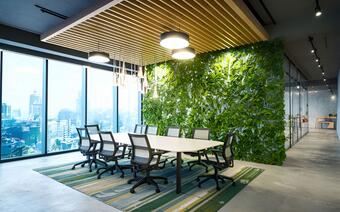In 2025, office rentals are undergoing a radical shift towards flexibility. With the rise of hybrid work and the need to quickly adjust to changing market conditions, flexible offices are becoming one of the main options for businesses of all sizes. Modern companies are seeking adaptability, which is why shorter and more flexible lease contracts, as well as spaces that can be customized according to business needs, are gaining traction.
Hybrid work has proven that employees can be productive from various locations, so businesses need workspaces that can quickly adjust to new dynamics. Offices with flexible lease terms allow companies to be agile and quickly adapt to changes in team size or market demands. The ability to modify office space according to the business's specific needs allows companies to operate more efficiently.
Key Benefits of Renting Flexible Offices in 2025
Risk Reduction
Flexible contracts avoid long-term commitments, which is ideal for growing or expanding businesses. According to a report by CBRE, 70% of tech companies are adopting flexible offices to better adjust to market fluctuations. This flexibility reduces financial exposure and allows businesses to adjust their workspace without incurring significant penalties.
Adaptability
Flexible offices allow businesses to adjust space according to their needs, whether by adding or reducing work areas. This ability to customize is essential in industries where quick responses are crucial. Adaptability also facilitates the implementation of new technologies and reconfiguring the space to improve collaboration and productivity.
Controlled Operating Costs
Renting offices with short-term contracts allows companies to better control their operating costs without committing to long-term payments. According to JLL's "Flexible Workspace Review," operating costs can be reduced by up to 20% by opting for flexible lease terms. Additionally, coworking spaces and flexible offices often include services such as internet, cleaning, and security in the rental price, simplifying management and reducing extra expenses.
Technology in Flexible Offices
Technology plays a crucial role in the revolution of flexible offices. The integration of IoT (Internet of Things) systems allows for more efficient management of space and resources. For example, smart sensors can monitor meeting room usage and automatically adjust lighting and HVAC to optimize energy consumption.
Digital platforms also make booking spaces and managing memberships easier, improving the user experience. The implementation of online collaboration tools and project management software enables teams to work more efficiently, regardless of their physical location.
Adapting to these changes will be key to future business success. Flexible offices not only offer a practical and cost-effective solution for modern businesses but also provide a dynamic and adaptable work environment that can quickly respond to changing market needs. The combination of flexibility, advanced technology, and reduced operating costs makes flexible offices an attractive option for any company looking to stay competitive in 2025 and beyond.




